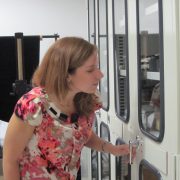Announcing Leadership Seminar for Affiliates
 Recognizing that the need for leadership skills is fundamental in the field, Smithsonian Affiliations has recently signed an agreement to offer leadership training to staff of Affiliate museums in collaboration with George Washington University’s Museum Studies Program. The Smithsonian has a long standing collaborative relationship with GW that encompasses internships, joint research programs, and research fellowships. GW’s Museum Studies program is a nationally-known graduate training program with core curriculum in collections, exhibition development and design, new media, and museum management and leadership. Since conducting a survey of Affiliate staff in 2012, GWs Associate Professor of Museum Studies, Martha Morris, has worked with Affiliations Director, Harold Closter, to design a two-day seminar to be held here in Washington, D.C., on June 26 and 27, 2014, following the Smithsonian Affiliations National Conference.
Recognizing that the need for leadership skills is fundamental in the field, Smithsonian Affiliations has recently signed an agreement to offer leadership training to staff of Affiliate museums in collaboration with George Washington University’s Museum Studies Program. The Smithsonian has a long standing collaborative relationship with GW that encompasses internships, joint research programs, and research fellowships. GW’s Museum Studies program is a nationally-known graduate training program with core curriculum in collections, exhibition development and design, new media, and museum management and leadership. Since conducting a survey of Affiliate staff in 2012, GWs Associate Professor of Museum Studies, Martha Morris, has worked with Affiliations Director, Harold Closter, to design a two-day seminar to be held here in Washington, D.C., on June 26 and 27, 2014, following the Smithsonian Affiliations National Conference.
Museums today face incredible challenges as well as new opportunities. Globalization, new technologies, competition, accountability, collections preservation, financial turmoil and staffing changes are all major concerns. In addition, professional standards and ethical mandates continue to evolve. Museums need highly trained staff, committed governance, and innovative leaders to assure their long term sustainability. The 21st-century workforce demands individuals who are collaborative, flexible, imaginative, and innovative. The goal of this collaboration between the Smithsonian and GW is to provide opportunities for staff at all levels of the museum to gain needed skills that will position them and their organization for success.
The program will provide opportunity for interaction with leaders at the Smithsonian and other museums as well as faculty of GW. Topics will include practical skills in management systems as well as strategic thinking and leadership philosophy. The value of the seminar will be in developing new skills as well as creating new networks for continuing professional growth.
The program will be reasonably priced with a limited number of scholarships available. Registration will be opening in April, but we encourage you to save the dates now. For further information about the seminar please contact Professor Martha Morris, George Washington University Museum Studies program at








